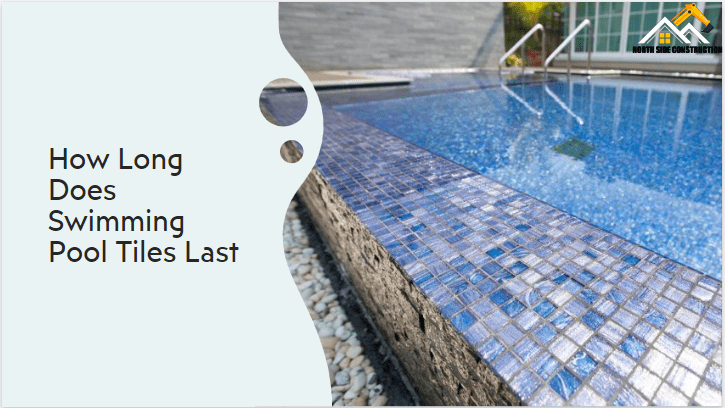How Long Does Swimming Pool Tiles Last – Swimming pools are a luxury many homeowners enjoy, but maintaining them requires attention to detail—especially when it comes to the tiles. But do you know how long swimming pool tiles last? Pool tiles are not only a visual element but also play a crucial role in the overall functionality and durability of your pool.
This guide will dive into the lifespan of swimming pool tiles, factors affecting their longevity, and provide answers to frequently asked questions to help you make informed decisions about pool tile maintenance and replacement.
The Lifespan of Swimming Pool Tiles
The lifespan of swimming pool tiles can vary widely based on several factors, including the type of tile, installation quality, and pool maintenance. Here’s a general overview of how long different types of pool tiles typically last:
- Ceramic Tiles: These are one of the most common choices for pool tiling due to their affordability and durability. When properly installed and maintained, ceramic tiles can last anywhere from 10 to 20 years. However, their longevity can be affected by factors such as water chemistry and exposure to pool chemicals.
- Porcelain Tiles: Known for their strength and low water absorption, porcelain tiles are highly resistant to the pool environment. They typically last between 15 and 25 years, making them a popular choice for high-quality and long-lasting pool tiling.
- Glass Tiles: Glass tiles are admired for their aesthetic appeal and reflective qualities. They are generally more durable than ceramic but can be more prone to cracking if not properly installed. Glass tiles can last from 10 to 20 years, depending on the quality and maintenance.
- Stone Tiles: Natural stone tiles, such as slate or travertine, offer a luxurious look and are quite durable. They can last 20 to 30 years or more. However, stone tiles often require more maintenance to prevent staining and damage from pool chemicals.
- Mosaic Tiles: These can be made from ceramic, glass, or even stone. Their lifespan varies depending on the material used but generally ranges from 10 to 20 years.
Factors Affecting Swimming Pool Tile Longevity
Several factors can influence the lifespan of swimming pool tiles:
| Quality of Materials: | Higher-quality tiles are generally more durable and resistant to environmental factors. Investing in quality tiles can reduce the frequency of replacements and ensure a longer lifespan. |
| Installation: | Proper installation is crucial for tile longevity. Poor installation can lead to issues like loose tiles, grout problems, and water infiltration, which can significantly shorten the lifespan of the tiles. |
| Pool Maintenance: | Regular maintenance, including balancing water chemistry and cleaning the pool, helps prevent issues such as grout erosion and tile damage. Neglecting maintenance can lead to faster wear and tear. |
| Climate and Environment: | The local climate and environmental conditions can also impact tile durability. For example, extreme temperature fluctuations and exposure to harsh chemicals can affect the integrity of pool tiles. |
| Usage: | The level of pool usage can also play a role. High traffic and frequent use of the pool can lead to faster wear and tear on tiles. |
Conclusion
Swimming pool tiles are a critical component of your pool’s appearance and functionality. Understanding their lifespan and the factors that influence their durability can help you make informed decisions about maintenance and replacement. By choosing high-quality tiles, ensuring proper installation, and maintaining regular pool care, you can maximize the lifespan of your pool tiles and enjoy your swimming pool for many years to come.
If you have any more questions or need further advice on swimming pool tiles, feel free to reach out to a North Side Construction at 0458 471 327 who can provide tailored recommendations for your specific needs.
FAQs on How Much Does Swimming Pool Tiles Last
1. How can I tell if my pool tiles need to be replaced?
A: Signs that your pool tiles may need replacement include:
- Cracking or Chipping: Visible cracks or chips in the tiles indicate damage that may require replacement.
- Loose Tiles: Tiles that are coming loose or detached from the surface can be a sign of installation issues or water damage.
- Discoloration: Significant discoloration or staining that can’t be cleaned may suggest that the tiles are nearing the end of their lifespan.
- Missing Grout: If the grout between tiles is deteriorating or missing, it can lead to water damage and indicate a need for replacement.
2. Can I replace just a few tiles, or do I need to replace all of them?
A: In many cases, you can replace individual tiles or small sections if only a few tiles are damaged. However, it’s essential to ensure that the new tiles match the existing ones in terms of color, size, and style. If a significant portion of the tiling is damaged, it might be more cost-effective to replace larger sections or even the entire tiled area.
3. How can I extend the life of my pool tiles?
A: To extend the life of your pool tiles, consider the following tips:
- Maintain Water Chemistry: Regularly check and balance the pool’s pH and chlorine levels to prevent damage to the tiles and grout.
- Regular Cleaning: Clean the tiles and pool area regularly to prevent buildup of debris and algae, which can cause damage over time.
- Inspect and Repair: Conduct periodic inspections of your pool tiles and address any issues promptly to prevent further damage.
- Avoid Harsh Chemicals: Use pool chemicals as directed and avoid overuse to protect the tiles from deterioration.
4. Are there any specific tile materials that are better for certain climates?
A: Yes, certain tile materials may be better suited for specific climates. For example:
- Porcelain and Glass Tiles: These are well-suited for areas with moderate to high temperatures as they are less likely to absorb water and are resistant to temperature fluctuations.
- Stone Tiles: While durable, stone tiles may require more maintenance in regions with high humidity or where freeze-thaw cycles are common, as they can absorb moisture and become prone to cracking.
5. How much does it cost to replace pool tiles?
The cost of replacing pool tiles can vary widely depending on factors such as the type of tile, the size of the area, and labor costs. On average, you might expect to pay between $10 and $30 per square foot for tile replacement, including labor. For high-end materials like glass or custom mosaics, costs can be significantly higher.

